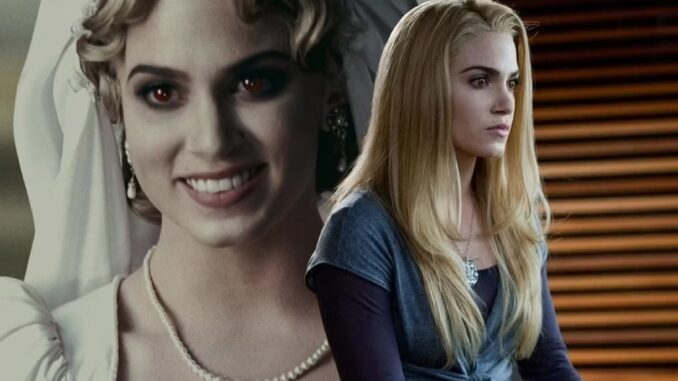
The Twilight saga’s minor player Rosalie is one of the Cullen Clan’s less utilized members, but she has an interesting and shockingly dark backstory
The Twilight saga’s minor player Rosalie is one of the Cullen Clan’s less utilized members, but she has an interesting and shockingly dark backstory that makes for a compelling narrative of its own. Released in 2008, Catherine Hardwicke’s Twilight was the beginning of a blockbuster series of movie adaptations for Stephenie Meyer’s teen romance phenomenon of the same name.
The Twilight saga may have been hated by critics, but the movies were well-liked by fans who felt that much of the novel’s appeal translated well to screen. Dramatic, theatrical, and specifically self-aware in their more over-the-top moments, the Twilight movies were a relatively successful set of adaptations despite their truncated runtime meaning the movies had little chance to illustrate a lot of interesting source material. Some elements were eliminated entirely, like the backstory of Rami Malek’s Benjamin, whereas some were briefly glimpsed but needed more focus to truly shine.

However, some elements of the Twilight saga were simply impossible to convert to effectively to film, as was the case with Rosalie Cullen’s backstory. It’s touched on briefly in one of the later movie adaptations, Eclipse, and compressed into a stylized sequence that feels out-of-place and oddly dark. But due to both time pressure and the family-friendly rating of the Twilight film series, Rosalie’s dark past isn’t dwelled on too long. A story of social division, betrayal, and eventually exploitation-movie worthy rape and revenge, Rosalie’s past is a very dark addition to Twilight’s lore that some readers may prefer to avoid, making it all the odder that the movies choose to keep this detail in at all (even if, like Marcus’ desire to die, it’s only included in sanitized, briefer form).
Rosalie Lived in the 1920s
Born in 1915 to a working-class family, Rosalie’s beauty meant she had been able to make inroads into the otherwise notoriously inaccessible upper echelons of New York society. In the Gilded Age era of social climbing love stories, Rosalie’s backstory begins as an extended reference to Fitzgerald’s The Great Gatsby or any of Edith Wharton’s novels of the era. Initially, hers is a story of a young woman in love whose future looks bright, but unfortunately, the flashback soon takes a dark (extremely dark, for the world of Twilight) turn.
Royce King II
Rosalie’s love interest Royce King II is sparsely featured in the Twilight source novels, but despite this, the character is played (for a few short sepia-toned moments) by Boardwalk Empire star and future Ben-Hur actor Jack Huston (interestingly, Huston also played Jack Kerouac in Kill Your Darlings the same year his Twilight co-star Kristen Stewart starred in the competing Kerouac biopic On the Road). In the flashback seen in Twilight: Eclipse, Rosalie is instantly smitten upon meeting Royce, the heir to a large fortune, and the feeling is very much mutual. The pair are engaged after a whirlwind romance, but one night on her way across the city Rosalie is harassed by a group of men realizing one of them is a drunk Royce and confronts him. At this point, the story takes a drastic dark turn given the tone established by the Twilight series thus far, and it’s one of many points where the differences between the movies and their source novels come into focus.
Eclipse is directed by 30 Days of Night helmer David Slade and is the darkest movie of the series in tonal terms, but the movie still doesn’t dwell on Rosalie’s fate due to its target audience and a desire to avoid depicting triggering content. Although it’s only referenced obliquely in the movie, in the source novel Rosalie is gang-raped by Royce and his associates and left for dead in the street by the gang. It’s then that Carlisle Cullen saves her life by turning her into a vampire, after a shockingly bleak moment which makes a blunt point about US class division in the era but whose out-of-nowhere explicit now is a serious surprise in the usually PG- rated world of Twilight.
Rosalie’s Revenge
This isn’t the end of Rosalie’s backstory, though, and the remaining content ends up even more compressed in the movie adaptation since very little of its story can be portrayed without the creative freedom of an R-rating. In what amounts to a vampiric retelling of I Spit On Your Grave (and is compressed into a rapid-fire montage in the movie), Rosalie uses her newfound powers to hunt down and kill her attackers one by one.